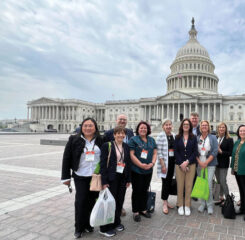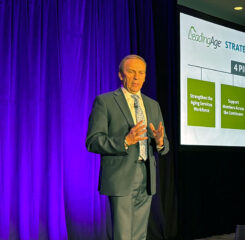LeadingAge Nursing Home Network – June 2022
The LeadingAge Nursing Home Network met on June 28 to review recent nursing home policy updates and share feedback among members. Register for the Nursing Home Network here. Check out the Nursing Homes page on the LeadingAge website here.
Policy Updates
Aging Services Workforce NOW! LeadingAge Director, Workforce and Technology Policy Andrea Price-Carter joined the Nursing Home Network to preview Aging Services Workforce NOW!, a LeadingAge workforce grassroots advocacy campaign. Planned campaign activity includes a Congressional briefing, an Administration briefing, a Virtual Day of Action, an Action Alert series, Administration and Congressional meetings and letters, and state-level Coffee Chats. Learn more here.
FY 2023 SNF PPS Proposed Rule LeadingAge submitted comments on the Fiscal Year (FY) 2023 Skilled Nursing Facility (SNF) Prospective Payment System (PPS) proposed rule on June 9. Comments included opposing the proposed parity adjustment to the Patient-Driven Payment Model (PDPM), feedback on several provisions related to the SNF Quality Reporting Program (QRP) and Value-Based Purchasing (VBP) program, and response to a request for information on ways to improve health equity. LeadingAge comments additionally responded to the request for information on mandatory minimum staffing standards, urging CMS to propose standards based on relevant, thorough, and updated research, and to consider barriers to compliance due to workforce shortages when determining enforcement. Read LeadingAge comments here.
John A. Hartford Foundation Grant to Advance Nursing Home Improvements and Reform LeadingAge has been awarded a $1 million grant from the John A. Hartford Foundation to further the recommendations of April’s National Academies of Sciences, Engineering, and Medicine (NASEM) report The National Imperative to Improve Nursing Home Quality: Honoring Our Commitment to Residents, Families, and Staff. This work will be led by LeadingAge in collaboration with the Institute for Healthcare Improvement (IHI). Read the press release here.
1135 Federal Blanket Waivers CMS released memo QSO-22-15-NH & NLTC & LSC on April 7 announcing termination of many of the 1135 federal blanket waivers applicable to nursing homes. Waivers terminated in 2 waves with the first round of waivers terminating on May 7 and the second round terminating on June 6. We released this LeadingAge article in June for more detailed information on specific second-round waivers. LeadingAge reminds members to document all issues and communications with state nurse aide training and testing programs. We are aware of training and testing backlogs in some states and continue to advocate for CMS intervention to prevent loss of these critical staff.
“Up to Date” Definition CDC recently updated the definition of “up to date” to reflect the CDC recommendation that individuals aged 50 years and older should receive a second COVID-19 booster. This changed definition impacted nursing home operations such as resident quarantine, staff work restriction, routine screening testing of asymptomatic staff, and, with the June 27 surveillance update, NHSN reporting. This changed definition means that nursing homes must now implement COVID restrictions for larger populations of staff who may be aged 50 and older with one or fewer COVID-19 boosters. LeadingAge sent a letter to HHS advocating for changes to COVID restrictions in order to be more consistent with other healthcare settings. Read this letter here.
Surveying for Compliance with Staff Vaccination Requirements CMS released memo QSO-22-17-ALL on June 14 announcing that compliance with the Omnibus COVID-19 Healthcare Staff Vaccination requirements would no longer be surveyed on all surveys. Primarily, these requirements will be surveyed during initial certification and standard recertification surveys; however, requirements may be surveyed outside the initial or standard recertification survey if triggered by a complaint or allegation of noncompliance. Staff vaccination requirements can be reviewed here (recall that identical forms of this guidance were issued in 3 separate memos due to different implementation dates).
Vaccination Expectations for Surveyors CMS released memo QSO-22-18-ALL on June 16 to rescind prior memo QSO-22-10-ALL that outlined CMS expectations for vaccination among State Survey Agencies and Accrediting Organizations. CMS notes that some states may have state-level requirements in place for the vaccination of surveyors that are unaffected by the rescission of the CMS memo. Providers may continue to inquire about the vaccination status of surveyors and/or offer testing or personal protective equipment in line with the providers’ policies; however, recall that the provider may not deny entry to a surveyor. Denying entry to a surveyor is a violation of the provider agreement and may be grounds for termination of the provider agreement. CMS states that any questions or concerns about vaccination status or protocols should be referred to the State Survey Agency or Accrediting Organization.
Congressional Update The Ensuring Seniors’ Access to Quality Care Act (S. 4381) was introduced in the Senate on June 13. This bill would allow reinstatement of a nursing home’s nurse aide training and competency evaluation program (NATCEP) earlier than the currently required 2-year lock-out if 1) the deficiencies were remedied, 2) there was no direct harm for substandard quality of care in the 2 years, and 3) the civil monetary penalty that triggered the lock-out was not due to an immediate jeopardy (IJ) citation for abuse or neglect. The bill would also give nursing homes access to the National Practitioner Data Bank, giving employers a greater ability to screen potential candidates. Participate in the LeadingAge Action Alert to ask your U. S. Senator to cosponsor this bill.
The Building America’s Healthcare Workforce Act (H.R. 7744) was introduced in the House in May. This bill would extend the flexibilities of the federal 1135 waiver related to the training and certification of nurse aides, terminated by CMS on June 6, for up to 24 months, allowing temporary nurse aides (TNAs) to continue providing care in nursing homes as they work toward certification. The bill would also allow for time spent working as a TNA to count toward the federally-required 75 hours of training required for nurse aide certification. Participate in the LeadingAge Action Alert to ask your U.S. Representative to cosponsor this bill.
The Travel Nursing Agency Transparency Study Act (S. 4352) was introduced in the Senate in June. This bill would require the Government Accountability Office (GAO) to conduct a study and issue a report on the business and payment practices of nurse staffing agencies. The study would look at the differences between charges to providers and payment to nurses, use of federal relief funds to pay staffing agencies, how states have imposed caps on traveling nurse pay, and the impact of traveling nurse pay in rural areas.
Member Feedback
During the June Nursing Home Network call, members expressed concern about backlogs in state nurse aide training and testing programs. With the nurse aide training waiver terminating in June, individuals working as temporary nurse aides (TNAs) have until October to satisfy state and federal requirements for nurse aide certification in order to continue working in the nursing homes. Members in several states reported that they are hearing of significant backlogs among these programs in their states and worry that TNAs will be unable to become certified by the October deadline. Not only will this force the nurse aides out of employment, but it will further exacerbate staffing shortages in long-term care. CMS has promised to release detailed information on addressing these backlogs prior to the October deadline and urges providers and TNAs to document all attempts to enroll in training and register for exams.
Members also discussed confusion around enforcement of CDC’s recently updated definition of “up to date” with COVID-19 vaccination. The updated definition impacts several aspects of nursing home care including quarantine of residents, work restriction of staff, and routine screening testing of asymptomatic staff. CMS has advised State Survey Agencies to be flexible in enforcement, but a lack of further detail has resulted in uneven application and enforcement of the new definition. Members previously expressed concern during the May Nursing Home Network call about the impact of this new definition, including expanded staff testing amid limited resources and increased isolation of residents due to quarantine recommendations.
The LeadingAge Nursing Home Network call takes place on the last Tuesday of every month. If you are a LeadingAge nursing home member and would like to join this group, you can register here. Your LeadingAge login is required to register. If you do not have a LeadingAge login, you can create one here using your work email address. Our next monthly call will take place Tuesday, July 26 at 2pm ET.

Most Recommended
February 29, 2024
Say Yes to Lobby Day!
April 05, 2024
Cyberattack Updates: Change Healthcare Payment Platform
March 27, 2024
 Colleagues on the Move, March 27, 2024
Colleagues on the Move, March 27, 2024
April 12, 2024
Improving Medicare Advantage
Recently Added
April 17, 2024



